Herbal Medicine: Dealing with Parasites in Goats and Sheep, Part 1
Herbal medicine to deal with parasites in goats and sheep. Learn how to use herbs, minerals and natural ways to prevent parasites, worms and biting insects on your homestead without using harmful and unnatural chemicals or drugs.
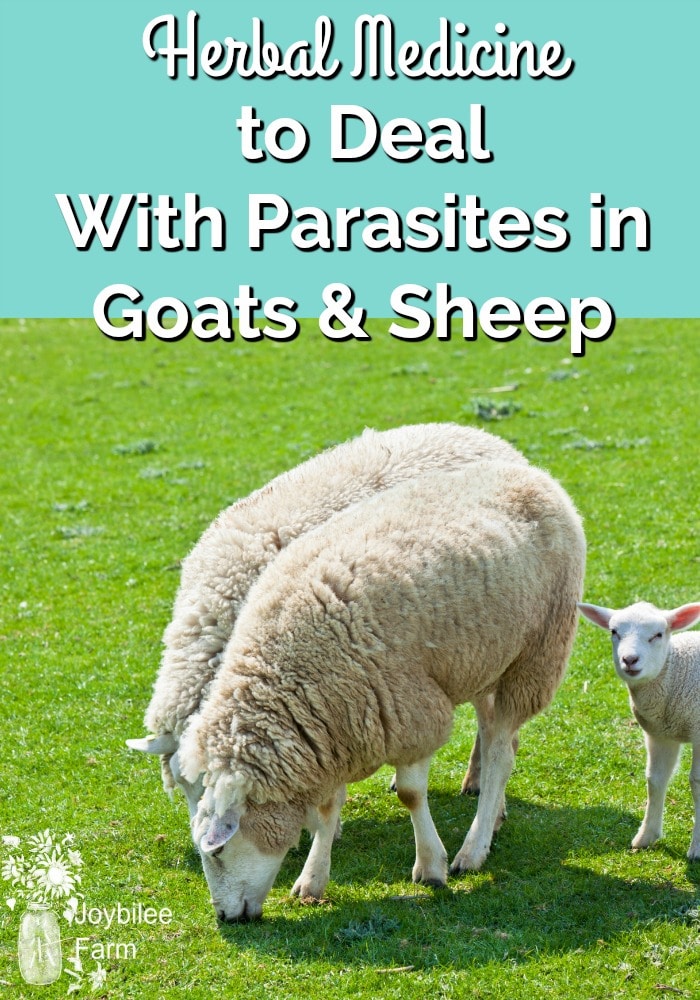
This is part 1 of a multifaceted series on Homestead Pharmacy: Dealing with Insect vectors of disease on your Homestead
Part 2: Homestead Pharmacy: Dealing with Insect vectors of disease without poisons
Part 3: Homestead Pharmacy: Dealing with fleas, lice, and ticks, without poisons
Worms and parasites are the number one issue on any homestead, that keeps goats and sheep. Parasites harm the animals, reduce weight gain, and hinder health. Parasites can even kill your animal. Most commercial farms use veterinary anti-parasite chemicals routinely, whether or not the subject animals actually have a worm load. Like antibiotic use in confinement operations, which create super-bugs resistant to antibiotics, so routine use of chemical wormers creates super-parasites that are resistant to worming — resulting in death for the animal. There is a healing alternative in herbs.
Parasites cannot develop immunity to herbs. Herbs work by both strengthening the immunity of the animal against the parasitic infestation, and by making the host inhospitable to the parasite. Think of the smell that comes from your pores after eating Indian, Greek, or Italian cuisine and you will understand this phenomenon.
Healthy goats and sheep don’t get infestations
Healthy goats and sheep rarely get parasite infestations. So your first line of defence against parasites is keeping your animals well-fed, with a balanced diet and adequate minerals. For goats, that means plenty of copper sulphate. Mix free choice copper with their other loose mineral, if you can’t find a specific goat mineral. If you are running goats and sheep together, you’ll need to keep the copper away from the sheep. We put the goats in a separate sleeping barn from the sheep so that each can get their own mineral at night. Never let your animals run out of minerals.
Salt blocks made for cattle do not give goats and sheep enough minerals for their needs. So we keep both sulphur, cobalt, and mineral blocks in the paddock, undercover, as well as offering, on a free-choice basis, loose mineral, kelp meal, and baking soda. With these available at all times, your animals will balance their own mineral needs. If it appears they are gobbling up the kelp meal and leaving the rest, just feed more kelp meal and they will eventually find a balance. Some people also feed Diatomaceous Earth, free choice, but we haven’t found a source for it here.
Pasture rotation is part of an integrated pest management plan to keep parasite infestations under control
Most parasites spend part of their lifecycle in other species before landing on the grass that your goat or sheep ingests. They then move from the stomach of your animal to another part of their body to continue the adult portion of their lifecycle, laying their eggs in the stomach of your sheep or goat. The animal poops out the eggs with their droppings, the droppings fall on the ground, and the cycle continues. By moving livestock onto clean ground regularly during the summer pasture season, the parasite cycle is broken and animals are not reinfected.
This benefit can be enhanced if you run multiple livestock on a rotational basis through your pasture, such as the following sheep with pastured poultry, which will scratch up manure and allow them to break down in the sunshine.
Keeping down the population of biting insects is important for integrated pest management on your homestead
Flies and other biting insects are vectors of disease. Hang fly traps in barns, stables, and around feeding areas. Encourage predatory wasps, which eat flies. Encourage bats, swallows, and bluebirds around your pastures and stables by placing birdhouses and bat houses for them to set up housekeeping in the spring.
Avoid using poisons as they are ineffective, and can also poison livestock and their food.
Hang a bug light with a mosquito attractant near your stables. These will clear an area up to 1 acre in size of biting insects, so place one near the night pen to inhibit mosquitoes, biting flies, and midges.
This is the one we use. It’s very effective, provided that the attractant is replaced at 30-day intervals, with continuous use. The light bulbs have a two-season lifespan with continuous 4-month usage during active mosquito season:
Flowtron BK-40D Electronic Insect Killer, 1 Acre Coverage
Keep areas where your livestock lives clean of debris and stagnant water that are the breeding grounds of these pests. Simply cleaning up and removing the breeding areas will cut back on the population.
House chickens, ducks, or guinea fowl around livestock areas to clean up larvae and adult insects from your farm. Allow these animals to free-range in your livestock paddocks, when your sheep and goats are taken to pasture in the morning.
Herbs to prevent parasite infestations in goats and sheep
Herbal remedies for parasite infestations are just part of a holistic program to keep livestock healthy, using the other complimentary actions — using a bug lamp to control mosquitoes, encouraging birds and bats to reproduce on your homestead, raising chickens, etc., will help to ensure that the herbs are effective. Several herbs can be used throughout the season.
Plants from the allium family:
Chives, Garlic, Onions, Leeks, Ramps are the first line of defence against parasites. The ideal is for these plants to be available in the pasture for your livestock to eat at will. If that’s not possible or in winter, garlic can be fed as whole cloves or crushed and fed with honey in a bread pill. (Bread pill: Take a slice of bread, mash it up in your fingers, mix in pulverized herbs and honey. Place in your animal’s mouth and hold the mouth shut until the pill is swallowed).
Plants for the Artemis family:
Wormwood, sage, and southernwood are aromatic herbs with soft, silvery foliage that goats and sheep seek out when they have parasite problems, mostly in Spring and Fall. You can harvest the leaves of these plants during flowering and dry them for winter use. A dried potpourri of wormwood also repels fleas, moths, and flying insects.
Other aromatic herbs:
Oregano, Thyme, Mint, Sage, parsley, dandelion, rosemary, all act by making the host inhospitable to the parasite. These also boost the animal’s health and immune response, keeping the animal clean. This is not an exhaustive list. While for livestock usually the fresh herb is used, because it is made available in the hedgerows, kitchen spices and herbs can be used as well. If it has a pungent odour it will probably be beneficial to your livestock.
Bark
The bark from many tree species is beneficial for your livestock — willow, pine, cottonwood, birch, aspen, spruce are just a few of the many barks that are beneficial for parasite infestation. Animals will naturally strip the bark from trees for this purpose. Protect the important ornamental trees from your livestock, so that they don’t help themselves.
Essential Oils for biting insects
Tea Tree Oil is being used to rid livestock of lice, ticks, and biting insects. A solution of 1% and 2% tea tree oil solution was effective in killing both adult lice and eggs in sheep in an experiment in Australia. The application of tea tree oil was 100% effective in ridding sheep of fly maggots in a fly-strike situation while it inhibited the adult flies. Sheep were dipped in the tea tree solution, after shearing. Simply spraying the tea tree solution on a fully wooled animal will be ineffective due to the lanolin in the sheep wool. In this situation applying tea tree by the drop over the top line of your animal should be effective. Please note that tea tree is toxic to cats and rabbits, and should not be used on them.
Lavender can also be used but at a higher concentration to inhibit fleas and flies. Lavender in oil applied to the top line of your animal will inhibit biting insects.
Recipe: Herbal spray to repel biting insects:
A combination of lemon verbena, tea tree, lavender, and cedarwood essential oil in an olive oil base will inhibit mosquitoes and flies from biting livestock in the field. This also works on nasal bot flies, by masking the carbon dioxide attraction of your animals — making the animal inhospitable. It is also antibiotic and antiseptic while relieving the itch from insect stings.
Mix 1 tsp. of each of these essential oils in 1 cup of olive oil. Shake well and apply by spraying lightly along the top line of each of your animals. Be sure to get the head, too. Avoid getting near the eyes and nose. Repeat after a soaking rainstorm or every 3 to 4 weeks.
Disclaimer: I am not a vet nor do I prescribe veterinary medicine. I am offering my own experience as a livestock producer with more than a decade of experience in raising livestock naturally on my homestead in British Columbia. Please consult your vet for serious problems with your livestock and do your own research to determine what is best for your own animals.
To help you with your own research check out these helpful resources:
The Complete Herbal Handbook for Farm and Stable
Natural Cattle Care
Natural Goat Care
Natural Goat and Alpaca Care, Second Ed.
Learn more about using herbs for health and wellness from my Book
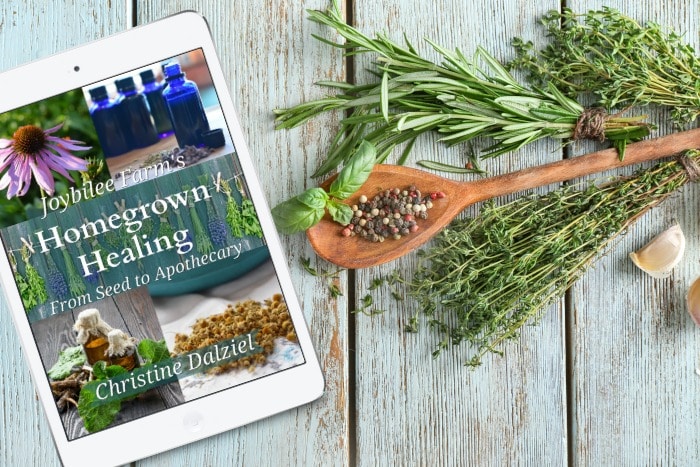
Homegrown Healing From Seed to Apothecary
My book Homegrown Healing From Seed to Apothecary will help you grow healing herbs in your own garden. Focusing on the easiest plants for beginners to grow, Homegrown Healing From Seed to Apothecary covers 30 plants, recommended by professional herbalists, that can be grown in the temperate zone. Initial garden preparation, garden design and harvesting tips lead the novice herbalist into early success. Choose which herbs to grow, learn how to use these herbs for your family’s health and wellness using the guidance in my book. You can find out more about this useful guide to growing more herbs and using them strategically here.


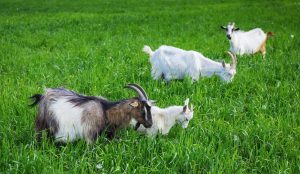
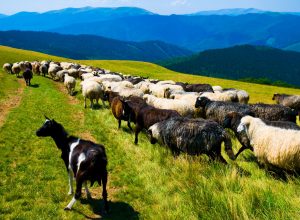
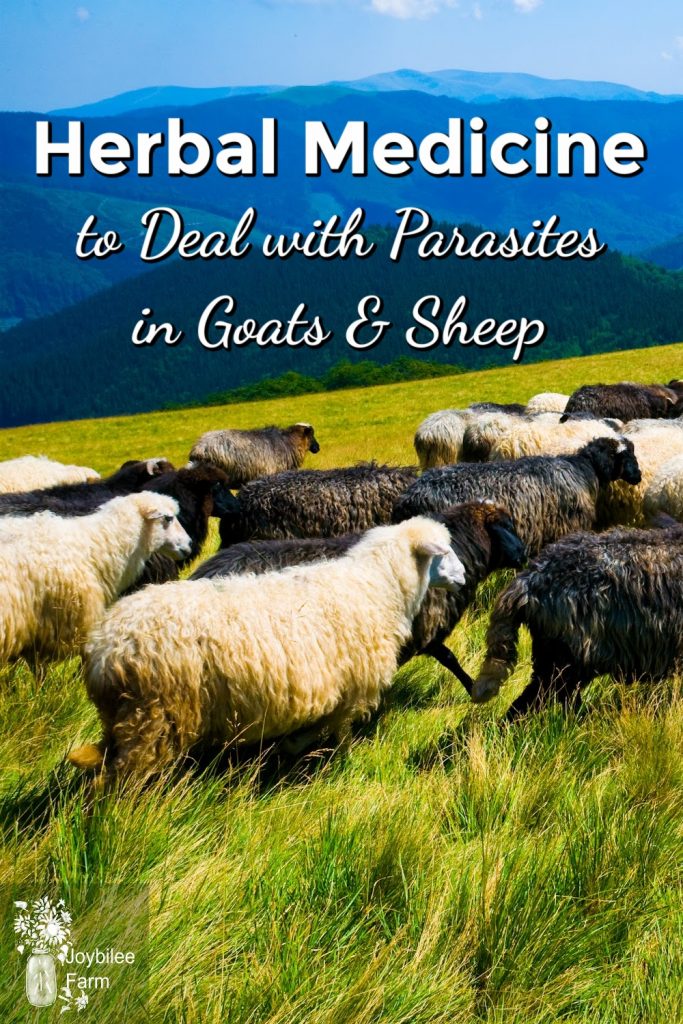


I find that healthy sheep will self medicate if the whole plant is offered to them, and they need it.
Great article,
I have dried Wormwood herb, how do you suggest I give that to my sheep that lost a lot of weight after giving birth to tweens?
Thank you for your article. We’ve lost so many alpaca to parasites and other maladies that I’m trying to figure out how to help them herbally instead of these commercial products. I tried to click on the link about natural care for alpacas 2nd edition but it didn’t work.. is there a new link that will bring to the info?
Tea tree can be diluted with a carrier oil like olive oil, sweet almond oil, etc. Don’t use canola, soy, corn, or cottonseed oil because of the pesticide residues. For external use only.
What should I dilute the Tea Tree oil with?